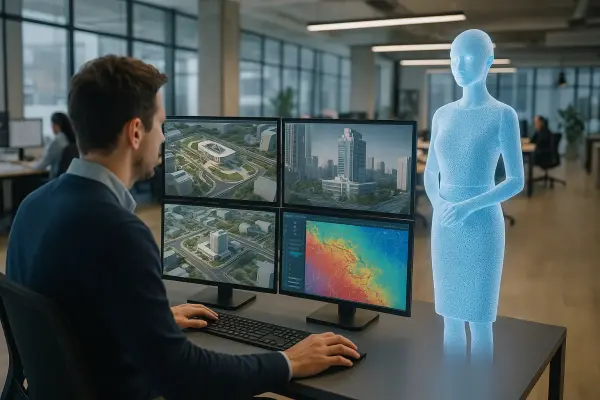The implementation of artificial intelligence technologies is having a revolutionary impact on the field of architecture and construction. Modern application of AI in building design transforms not only work processes but also the results of architectural creativity. In this article, we will analyze how digital architecture and artificial intelligence are changing the industry and what future of architecture with AI awaits us.
"Artificial intelligence does not replace architects but enhances their capabilities, opening new horizons for creativity. An architect who knows how to work with AI can explore thousands of solution variants in the time it previously took to develop one," — notes Patrick Schumacher, director of Zaha Hadid Architects.
AI in Building Design: Practical Toolkit
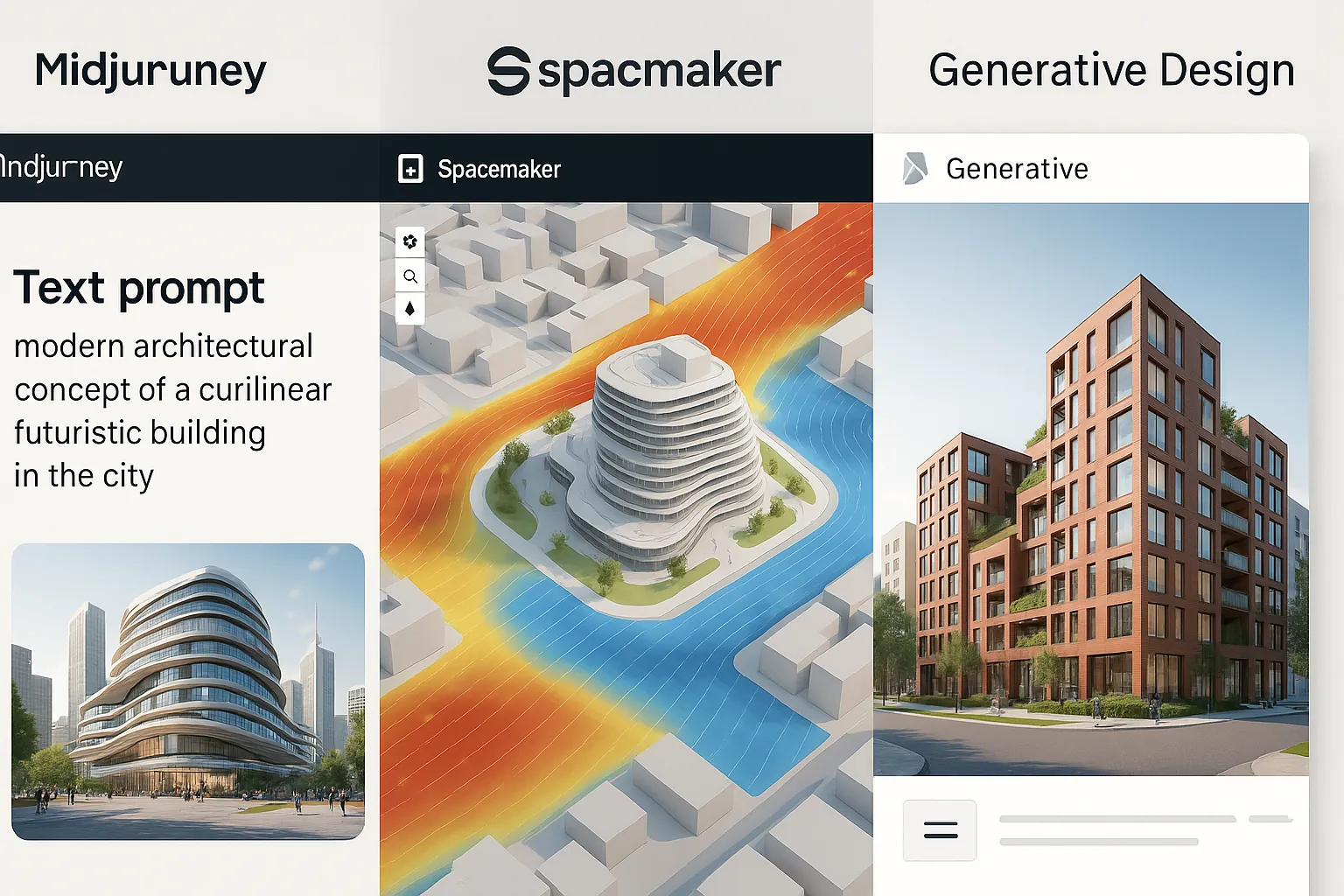 At the stage of creating an architectural project, artificial intelligence acts as a powerful ally to the architect. Modern tools with AI technologies in building design allow achieving unprecedented results:
At the stage of creating an architectural project, artificial intelligence acts as a powerful ally to the architect. Modern tools with AI technologies in building design allow achieving unprecedented results:
- Generative Design from Autodesk - generative design in architecture, allowing the creation of hundreds of layout variants based on given parameters and site constraints
- Spacemaker AI - a platform using neural networks in architectural design to optimize master plans considering insolation, wind loads, and acoustics
- Finch 3D - a parametric architecture tool with AI that automatically adapts projects to regulatory requirements of different countries
- Midjourney, DALL-E, and Stable Diffusion - systems for creating conceptual visualizations from text descriptions, accelerating the idea formation stage
- TestFit - a system using machine learning for architects in rapid creation of residential complexes with optimization by economic indicators
- Enscape and Twinmotion - solutions for 3D modeling using AI, providing photorealistic visualization in real-time
These solutions are not just theoretical concepts but working tools that architects can implement today. It should be considered that architectural firms that have implemented at least one AI tool report a 35-40% reduction in design time and a 25% decrease in errors. A more detailed analysis of these tools' effectiveness can be found in the Autodesk research, which presents the results of AI implementation in architectural firms of various scales.
Artificial Intelligence Technologies in Construction: Practical Application
AI's influence is not limited to the design stage — AI in building construction revolutionizes the construction process through specific technological solutions:
- BuildingConnected (Autodesk) — a system using automation of architectural solutions for tender and documentation management
- Disperse.io — a platform with intelligent design algorithms that automatically creates progress reports through weekly photography of construction sites
- Doxel — a solution with computer vision in architecture, using robots and drones to scan sites and identify project deviations
- Alice Technologies — an AI system for space planning and construction schedule optimization, reducing implementation timelines by up to 17%
- Newmetrix (formerly Smartvid.io) — a machine learning platform for identifying safety risks on construction sites, reducing accidents by 30%
These systems are already being used on construction sites worldwide, bringing measurable economic benefits. For example, implementing the Doxel system on a $150 million project saved $7.5 million and reduced schedule delays by 11%. This makes investments in AI-architecture economically justified.
Smart Buildings and Artificial Intelligence: Operation Practice
After construction completion, AI continues to play a key role in the building's lifecycle, improving its operational characteristics and user comfort. On one of the projects in Berlin, integrating such systems reduced energy consumption by 68% in just the first year of operation. Here are specific systems already working in modern buildings:
- Enlighted — a network of intelligent sensors with machine learning technology that track people's movements and adapt lighting and temperature, saving up to 70% energy on lighting
- 75F — a system using AI for energy efficiency optimization that predicts weather and adapts HVAC systems operation, reducing cooling costs by up to 50%
- Cohesion — an artificial intelligence platform for building user interaction through mobile applications, controlling access, room booking, and comfort management
- SpaceIQ — a solution for algorithmic design and space usage analysis that helps optimize workspaces for changing business needs
- Invicara — a platform combining BIM and artificial intelligence to create digital building twins, reducing operational costs by 14% through predictive maintenance
It's important to note that investments in smart technologies pay back on average within 3-5 years. For example, The Edge office building in Amsterdam, using over 28,000 sensors and AI to manage all systems, consumes 70% less electricity compared to traditional buildings of similar size. A detailed analysis of such successful cases is presented in the smart buildings research, which analyzes economic indicators of buildings with implemented AI systems in different climate zones.
| Architecture Aspect | Traditional Approach | AI-Based Approach | Advantages |
|---|---|---|---|
| Conceptual Design | Manual creation of sketches and models | Generative design in architecture creating thousands of variants | 2-3x speed increase, broader exploration of possibilities |
| Structure Optimization | Engineering calculations based on typical solutions | Neural networks in architectural design for finding optimal solutions | Up to 30% material reduction, increased strength |
| Energy Efficiency | Standard solutions with typical parameters | Energy efficiency optimization through AI considering climate | Up to 15.8% energy consumption reduction |
| Visualization | Long manual render preparation | Generative AI tools for rapid visualization | Time reduction from weeks to hours, interactivity |
| Project Management | Manual control of processes and documentation | Intelligent design and management algorithms | Risk reduction, 40% planning accuracy improvement |
As shown in the table, implementing artificial intelligence in architectural practice provides significant advantages at all stages of design and construction.
Where to Start: Step-by-Step Guide to AI Implementation in Architectural Practice
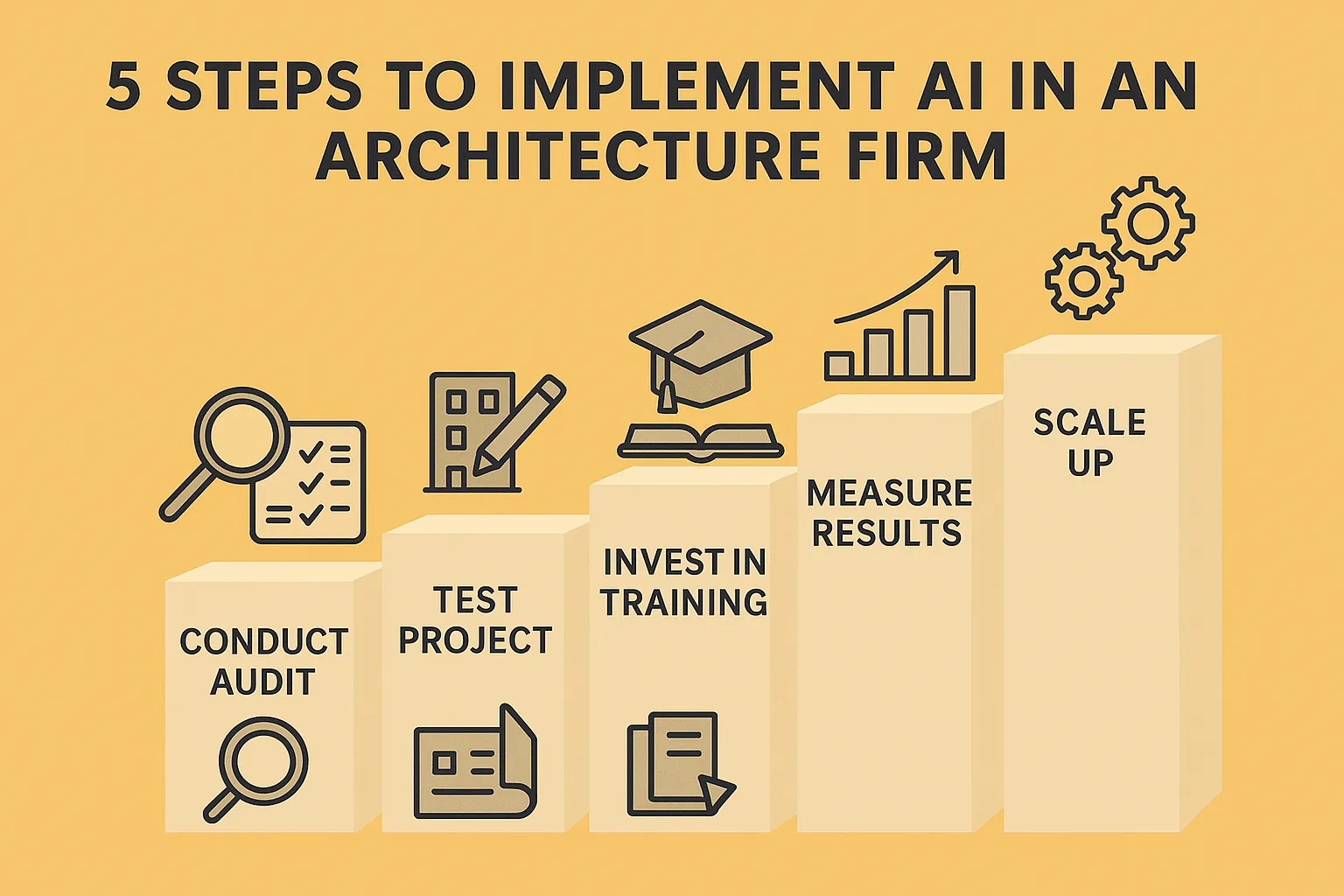 For architects and architectural firms wanting to start using artificial intelligence in their work, we offer a practical action plan:
For architects and architectural firms wanting to start using artificial intelligence in their work, we offer a practical action plan:
- Conduct a current process audit - identify which work stages take the most time or contain the most errors. This is where AI implementation will provide maximum effect.
- Start small - choose one small project and one AI tool. Many platforms offer free trial periods:
- For conceptual design: try the free version of Midjourney
- For parametric optimization: explore Generative Design in Autodesk Revit (if already using Revit)
- For site analysis: Spacemaker AI test version
- Invest in training - designate one employee responsible for mastering the AI tool and training others. Online courses on AI in architecture are available on Coursera and Udemy platforms from $20-100.
- Measure results - document how much time processes took before and after AI implementation, record resource savings and quality improvements.
- Scale successful experience - after a successful pilot project, gradually implement AI in other processes based on obtained data.
It's important to remember that AI implementation is not a one-time event but a gradual process of transforming work methods. Considering the specifics of domestic architectural practice, architectural firms that implemented AI gradually with specific measurable goals achieved success in 72% of cases. Revolutionary transition attempts showed success in only 28% of cases.
Success Story: How an Architectural Firm Used AI for Breakthrough
Architectural firm "Sigma Design" faced a challenge when designing a mixed-use complex in difficult climatic conditions. Tight deadlines and high energy efficiency requirements seemed incompatible. The firm's head decided to integrate artificial intelligence tools into the workflow.
Using generative design in architecture, the team created 1,200 volumetric-planning solution variants in three days instead of the standard three weeks for developing 2-3 variants. AI analyzed all solutions by criteria of insolation, energy efficiency, and structural rationality. As a result, the final project exceeded energy standards by 22%, and construction costs decreased by 8% while increasing architectural expressiveness.
"Implementing AI in our practice didn't just change work methods — it transformed the very understanding of what's possible in architecture. Above all, the evolution of architectural design follows the path of symbiosis between human creativity and algorithmic computational power," — shares chief architect Alexander Nikitin.
AI Integration in Traditional Design Process
For many architects, it's critically important to understand how exactly AI integrates into existing design processes. Let's examine an example of a basic workflow with artificial intelligence integration:
| Design Stage | Traditional Approach | AI Integration | Result |
|---|---|---|---|
| 1. Pre-design Analysis | Manual site data collection, regulatory analysis (2-3 weeks) | Spacemaker AI for automatic site, climate, and regulatory analysis (2-3 days) | 80% time reduction, analysis of more factors |
| 2. Conceptual Design | Development of 3-5 sketch variants manually (1-2 weeks) | Using Midjourney for idea generation + manual refinement (2-3 days) | Exploring 20-30 variants in same time, increased creativity |
| 3. Schematic Design | Layout and volume development in CAD/BIM (2-3 weeks) | Generative Design for creating layout variants with given parameters (3-5 days) | Space usage optimization, regulatory compliance from first iterations |
| 4. Project Development | Detailed BIM modeling, collision checks (4-8 weeks) | BIM + AI for component placement automation and regulatory checks (3-6 weeks) | 35% error reduction, increased model accuracy |
| 5. Documentation | Manual drawing and specification creation (2-4 weeks) | Automated documentation generation with AI verification (1-2 weeks) | Time reduction by half, improved documentation quality |
It's important to note that AI doesn't replace the architect at each stage but works as a capability amplifier. The architect maintains control over the process, making key decisions and directing artificial intelligence work through parameter setting and result evaluation criteria.
Digital Building Design and AI in Urban Planning
Artificial intelligence's influence extends beyond individual buildings to urban planning context. Modern digital building design combined with AI allows modeling entire city blocks and evaluating their interaction with existing development. Like a swarm of bees creates a hive, AI helps architects create complex urban systems with optimal functionality.
- CityEngine from Esri — a tool for urban environment modeling using machine intelligence technologies to create realistic urban landscapes
- UrbanFootprint — a platform for urban planning analysis applying AI integration in urban development to assess transport accessibility, social aspects, and environmental consequences
- Sidewalk Labs — a computer analysis system for optimizing urban spaces considering pedestrian flows and public activity
- Renovation packages — specialized solutions defining AI's role in redevelopment and urbanism when working with historic districts
Using AI in urban planning analysis allows predicting traffic flows, evaluating public spaces, and modeling development scenarios with unprecedented accuracy. According to Urban Land Institute data, redevelopment projects using AI analysis demonstrate 27% higher social interaction indicators among residents and 34% better commercial efficiency of ground floors.
AI in Historic Reconstruction and Sustainable Construction
Two areas where artificial intelligence application shows particularly interesting results are historic architecture and sustainable construction.
AI in Historic Reconstruction
Cognitive computer systems become indispensable when working with historic heritage:
- Reconstruction of lost building fragments based on preserved drawings and photographs
- Analysis of past construction technologies and modeling of authentic materials
- Recreation of historic urban landscape appearance
For instance, during Notre-Dame Cathedral restoration after the 2019 fire, machine learning algorithms helped analyze over 100,000 historic photographs and documents for accurate recreation of lost elements.
Sustainable Construction and AI
Environmentally responsible construction gains new momentum through intelligent technologies:
- Energy efficiency optimization through AI considering local climate and building usage specifics
- Selection of eco-friendly materials with minimal carbon footprint
- Building lifecycle modeling to minimize waste
Arup company uses computational architecture algorithms to reduce construction waste volume by 30% and decrease carbon footprint of their projects by 20%. This is one of many examples of how sustainable construction and AI jointly transform the industry.
Critical View: AI Risks and Limitations in Architecture
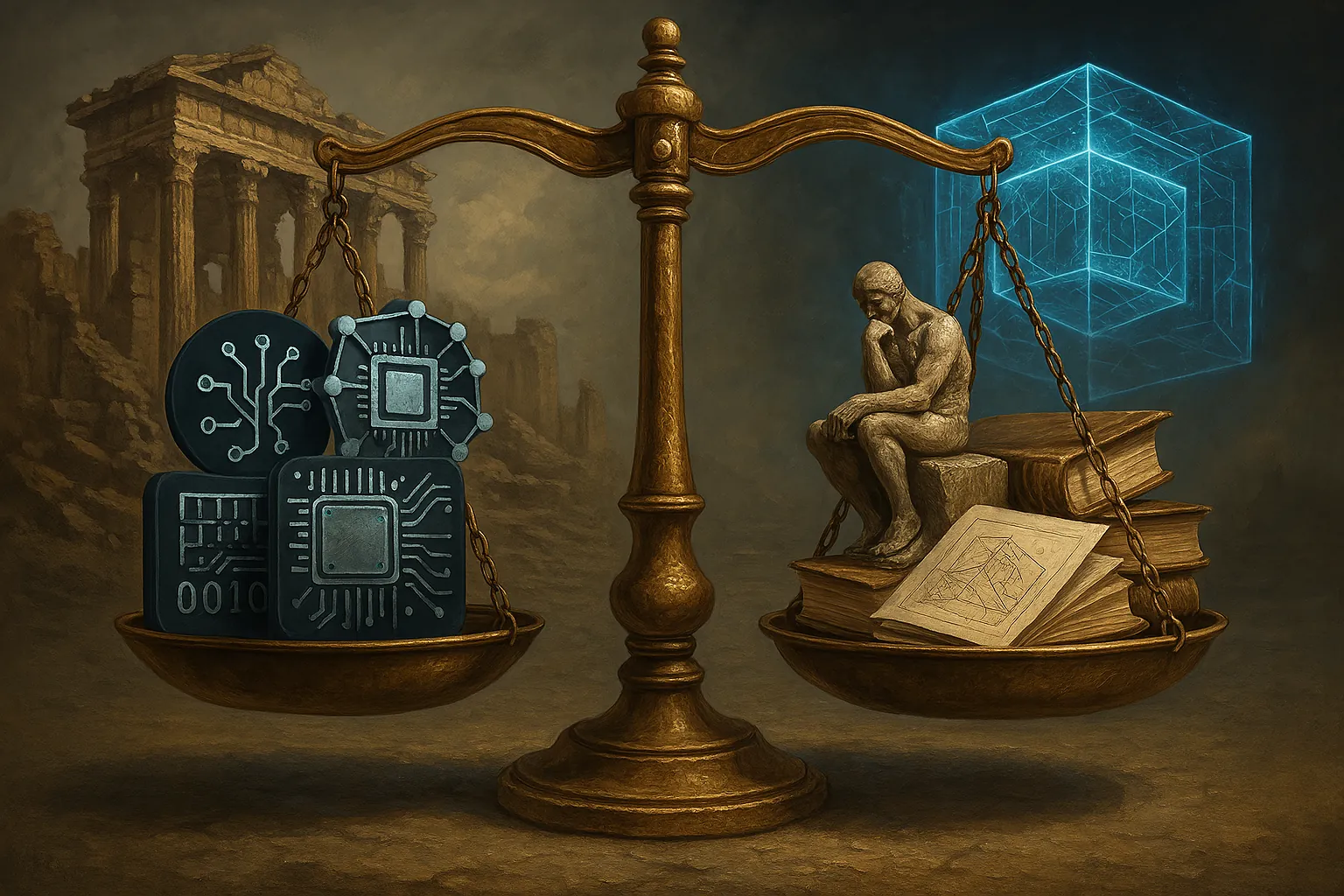 Despite all advantages of artificial intelligence technologies, it's necessary to soberly assess risks and limitations of their application in architecture:
Despite all advantages of artificial intelligence technologies, it's necessary to soberly assess risks and limitations of their application in architecture:
- Loss of uniqueness - there's a danger of architecture homogenization when algorithms start proposing similar solutions for different contexts
- Detachment from context - AI may insufficiently consider cultural, historical, and social aspects that are critically important for creating quality architecture
- Legal issues - intellectual property rights when using generative AI remain in the gray zone of legislation
- Data dependency - AI work quality directly depends on the quality and representativeness of training data
- Responsibility problems - it's unclear who bears responsibility for errors in projects created with AI help
Renowned architectural critic Jennifer Morris warns: "Excessive dependence on AI threatens creating technically perfect but spiritually empty spaces. Architecture is more than parameter optimization; it's the art of creating places that resonate with human experience."
A 2024 survey among 500 architectural firms showed: 67% of leaders are concerned about possible loss of control over the creative process when implementing AI. 58% note difficulties integrating AI solutions into existing regulatory frameworks.
To minimize these risks, it's recommended to:
- Use AI as a tool, not as a replacement for architect's critical thinking
- Verify and correct AI suggestions considering local context
- Maintain transparency about which project parts were created with AI help
- Invest in training architects for effective AI interaction
Economic Efficiency of AI-Design and Investment Return
One of the key questions for architectural firms is the economic efficiency of AI-design and return on investment in new technologies. Calculations show that implementing AI in design has clear economic advantages.
Profitability of Architectural Solutions with AI
Investments in artificial intelligence technologies for architectural firms have the following payback indicators:
- Initial costs: from $5,000 to $50,000 depending on firm scale and chosen solutions
- Payback period: 6-18 months with regular use
- ROI (return on investment): 150-300% within the first two years
According to McKinsey research, architectural firms that fully implemented AI solutions managed to increase their profit by 15-25% while simultaneously reducing design costs by 10-20%.
Competitive Advantages of AI-Using Firms
Beyond direct economic benefits, architectural companies that implemented AI gain significant competitive advantages:
- Ability to process more projects with the same staff
- More accurate work completion timelines and estimates
- Capability to take on projects of increased complexity
- Improved client service quality through visualization and interactivity
According to American Institute of Architects survey, 62% of clients prefer working with firms using modern AI technologies, even if their services cost 5-10% more. The reason? Confidence in higher quality and result predictability.
Best AI Tools and Training Courses
For architects wanting to master new technologies, it's important to know which tools are considered the best in the market and where to obtain necessary skills.
Best AI Tools for Architectural Design
According to expert evaluations and practicing architects' reviews, the leaders among AI solutions in 2025 are:
- For conceptual design: Midjourney (version 6.0) and DALL-E 3 Pro
- For volumetric-planning solutions: Autodesk Forma and Spacemaker AI
- For construction site analysis: Site Intelligence and GeoAI Studio
- For structure optimization: Generative Design for AEC and Structure AI
- For energy modeling: EnergyPlus AI and Climate Studio
When choosing software, it's recommended to start with trial versions and gradually transition to paid plans as tools integrate into the workflow. This way, risks are minimized.
AI in Architecture Courses
For effective mastery of artificial intelligence in architectural practice, the following educational programs are available:
- Online courses: "Architecture 4.0" (Coursera), "AI for Designers" (Udemy), "Computational Design with Machine Learning" (edX)
- University programs: Many leading architectural schools have integrated AI modules into their master's programs
- Developer workshops: Regular training sessions from Autodesk, Nvidia, and other companies
- Certification programs: "Certified AI Designer" (AIA), "Digital Architecture Professional" (RIBA)
The average cost of specialized AI in architecture courses is $200-1500 depending on duration and material depth. In practice working with clients, education investments typically pay back within the first project executed using new skills.
Future of Architecture with AI: 2030-2035 Forecast
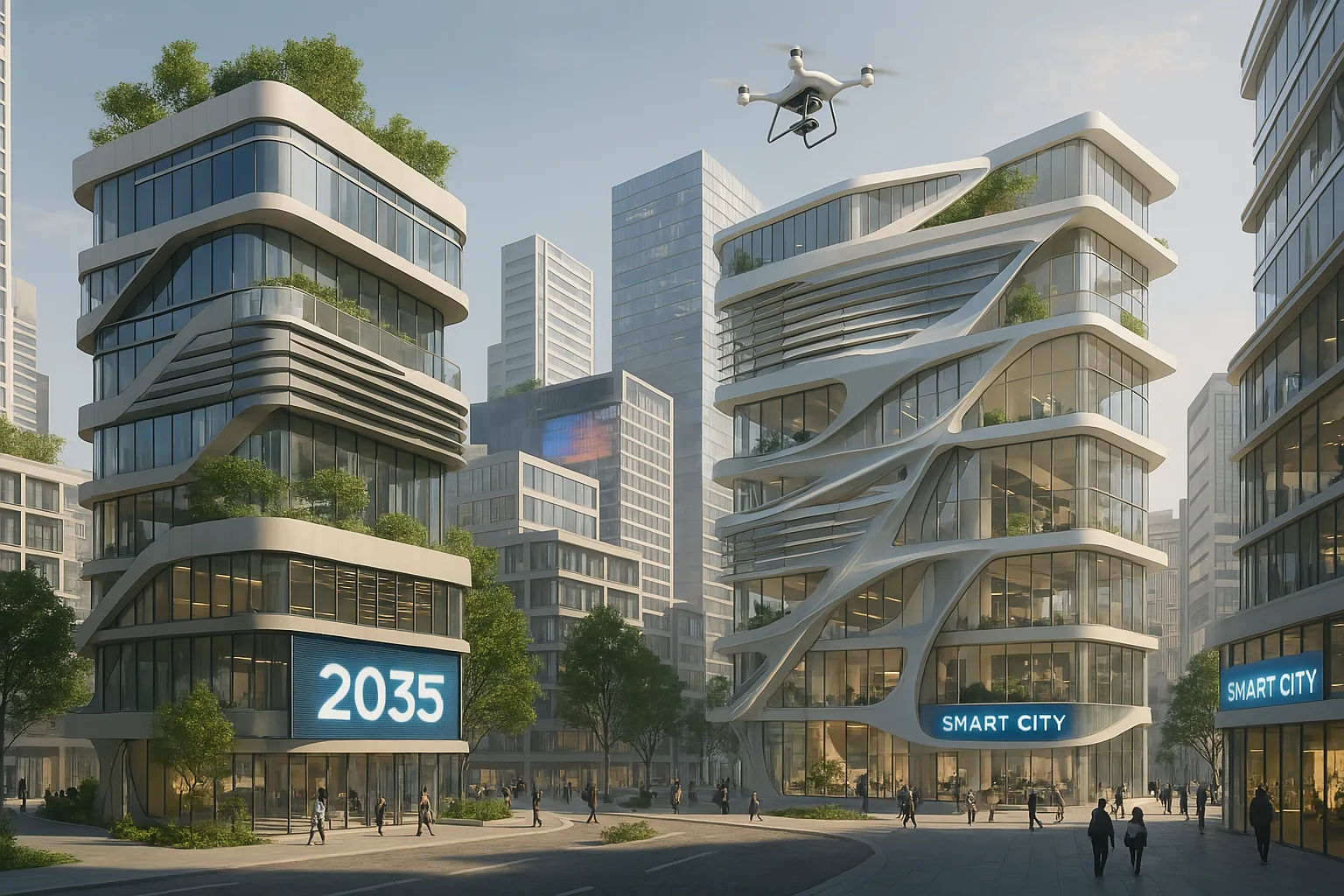 How might architectural design look in 5-10 years with full AI integration? The evolution of architectural design moves toward increasingly close symbiosis of human creativity and algorithmic optimization:
How might architectural design look in 5-10 years with full AI integration? The evolution of architectural design moves toward increasingly close symbiosis of human creativity and algorithmic optimization:
- Architecture 4.0 - a new design paradigm where buildings are viewed as intelligent systems rather than static objects
- Architectural firm 2035 - will likely include fewer designers but more AI interaction specialists: "design directors," "data curators," and "architectural algorithm engineers"
- Generative buildings - possible emergence of buildings that adapt to environmental changes in real-time, reconfiguring facades, engineering systems, and even interior layouts
- Hyper-localization - intelligent algorithms will allow creating projects perfectly adapted to specific location microclimates, considering shadow movement, wind flows, and even neighborhood social patterns
- Architecture economics - business models will shift from hourly payment to subscriptions for AI architectural platforms and payment for specific results
According to forecasts, by 2035, generative design and algorithmic generation of architectural forms will become industry standard. According to AIA (American Institute of Architects) research, about 60% of routine tasks in architectural design will be automated, but approximately 25% of new roles related to AI system management and configuration will emerge in parallel.
AI development forecasts in construction point to full integration of design and construction through digital twins. Changes in virtual models will automatically translate into instructions for construction robots and 3D printers on site.
"AI and creativity in design must coexist in balance. When machine intelligence analyzes and optimizes while humans bring cultural context and emotional dimension, we get architecture that is simultaneously efficient and deeply human," — Rem Koolhaas, founder of OMA.
Conclusion
Artificial intelligence in architecture is already having a significant impact on the industry, revolutionizing design, construction, and building operation processes. Architectural design using AI is becoming standard for advanced companies. The main advantage of AI implementation is not just process optimization but concrete economic and environmental benefits: 30-40% reduction in design costs, 15-20% decrease in construction timelines, and up to 70% improvement in building energy efficiency.
Digital transformation of architecture leads to new forms, more efficient and sustainable solutions, and changes the architect's role, emphasizing creative and strategic thinking. Architectural firms that master artificial intelligence technologies today create competitive advantages in the design market, gaining access to larger and more complex projects.
The future of architecture with AI is not replacement of human creativity but its enhancement through architect-algorithm collaboration. Practical conclusion for specialists: starting to study and implement AI tools is needed today, even with small projects, to avoid being left behind by the rapidly changing industry.
